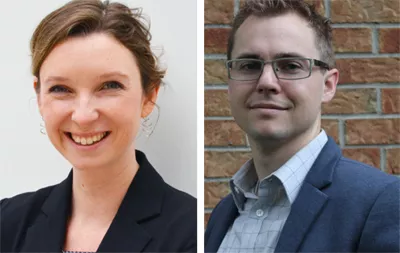
SSHRC Insight and Insight Development Grant Funding for UTM researchers
Professor Laurel Besco in UTM’s Department of Geography was delighted when she received news while overseas at a conference this summer that she was a recipient of the latest round of funding from the Social Sciences and Humanities Research Council of Canada (SSHRC) Insight Development Grant competitions. Even more delightful: she was not the only in her family to achieve SSHRC success this summer.
When it comes to her new Insight Development Grant (IDG), Laurel, who is also cross-appointed to the Institute for Management & Innovation, and focuses on environmental law and policy in her research, will use the funds, which total over $55K, for her project “Engendering the Production of Corporate Environmental Norms: Implications for Achieving Energy Efficiency Targets.”
The goal of Laurel’s work on this project is to study corporate environmental action, and to better understand how innovative law- and policy-instrument design can encourage corporations to improve their environmental action. For example, is it necessary to place legally binding requirements on companies to get them to take environmental actions, such as installing energy efficient lighting? Or, can a government providing information about competitors’ actions or societal expectations also change corporate behavior? This inquiry will provide a better understanding of these motivations and could potentially help to achieve larger-scale environmental goals.
For the Besco household, the SSHRC-grant triumph did not end with her: her partner, UTM Postdoctoral Fellow Randy Besco in the Department of Political Science was also awarded, as a Principal Investigator, a SSHRC IDG for his own project, “When Politicians Attack: Political Participation and Criticism of Minority Groups.” He is working on the project with UTM co-applicant Professor Erin Tolley, and was funded almost $48,000.
This project aims to understand the effect of attacks and criticisms of minority groups by politicians on the political participation of those who are targeted. For example, what are the impacts of comments such as those being made by US presidential candidate Donald Trump or those made during the 2015 Canadian federal election when the niquab issue was raised? On one hand, these attacks could motivate minorities to engage in politics in order to challenge or counteract the perceived attack. Or, they could discourage minorities from participating because of a loss of efficacy and a sense of alienation. Through better explaining the impacts of these attacks and criticisms by politicians, the goal of this research is to understand how best to sustain the democratic participation of these citizens.
This SSHRC grant is an impressive achievement, not only because this was Randy’s first time applying, but also because he applied as a postdoctoral fellow, which is the first time in UTM’s history that a postdoc was awarded a grant of this caliber.
Along with both Bescos, UTM had an impressive list of successes in this round. The recipients for the 2016 IDG competition include the following:
- Professor Judith Anderson, Department of Psychology, for her project “In the Line of Fire: Do Implicit Attitudes Influence Police Use of Force Behaviour Towards Vulnerable Populations?”;
- Professor Ron Buliung, Department of Geography, for his project “Going to School: Toward Understanding the School Travel Experiences of Dis/abled Children and their Households;”
- Professor Brian Gettler, Department of Historical Studies, for his project “Indian Affairs and Confederation, 1860-1876;”
- Professor Andrea Olive, Department of Political Science, for her project “Political Ecology of the Bakken Formation;”
- Professor Erik Schneiderhan, Department of Sociology, for his project “Developing a Diary Study to Examine Sexual Violence on Campus;”
- Professor Michel Serafinelli, Department of Economics, for his project “Mobility of Inventors and Innovation in Matched Patent-employer-employee Data;”
- Professor Holger Syme, Department of English & Drama, for his project “Dramatic Classics on the Contemporary Stage: Six International Case Studies;”
- Professor Victoria Tahmasebi-Birgani, Department of Historical Studies, for her project “Iranian Women’s E-Diasporic Networks: Feminist Struggles in a Transnational Context;”
- Professor Doug VanderLaan, Department of Psychology, for his project “Children’s Appraisals of Gender Nonconformity: Identifying Strategies to Limit the Emergence of Stigmatizing.”
The Insight Grants (IG) were also awarded and Professor Andrew Sepielli from the Department of Philosophy was one of four UTM faculty members who have been awarded funds in the 2016 IG competition for his project, “Moral Uncertainty and its Practical Implications.”
"Fundamental moral questions are extremely difficult to answer," says Sepielli.
"We are often uncertain about them, and our uncertainty is, I think, exactly the right reaction. My research is about how we ought to live our lives in the face of moral uncertainty."
Sepielli will use the $80,600 grant to fund his research into the question of how we ought to act in the face of moral uncertainty, and the implications of moral uncertainty for issues like the ethics of climate change.
The other three UTM recipients of the SSHRC IGs include the following:
- Rahul Deb, Department of Economics, for his project, “Revealed Price Preference: Theory and Stochastic Testing;”
- Robert McMillan, Department of Economics, for his project, “Accountability Incentives and Education Performance;”
- Erik Schneiderhan, Department of Sociology, for his project, “Ethnicity in the Public Sphere: Political Deliberation on Salient Policy Issues in Canada;” Schneiderhan was also successful in the IDG competition as noted above.
The overall SSHRC Insight program aims to build understanding and knowledge about people, societies and the world, with funds being awarded annually to support research excellence in all SSHRC eligible subject areas.
For all SSHRC competition results and award recipients, please see SSHRC’s website.
